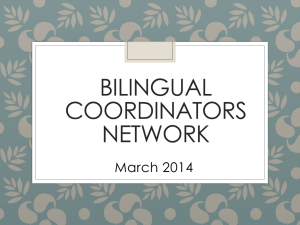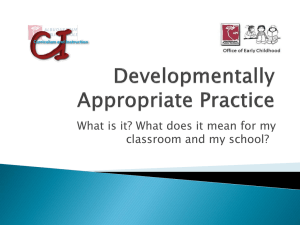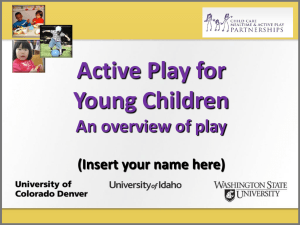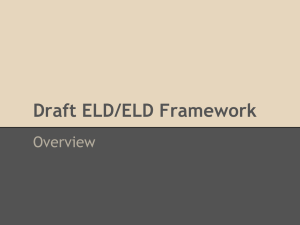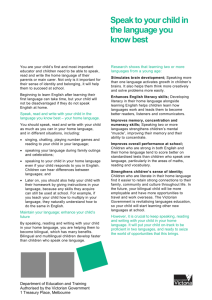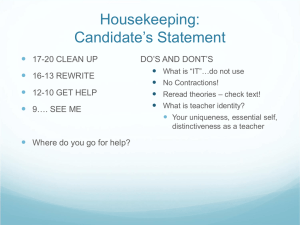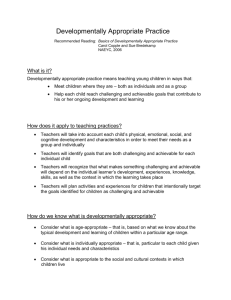- San Diego State University
advertisement
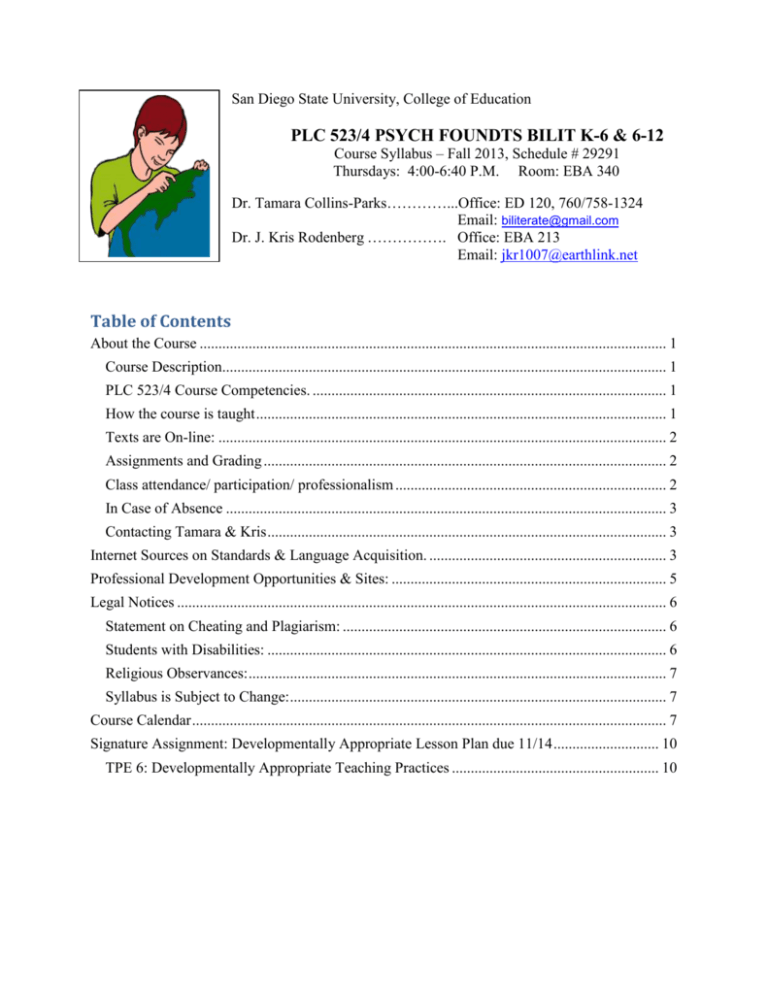
San Diego State University, College of Education PLC 523/4 PSYCH FOUNDTS BILIT K-6 & 6-12 Course Syllabus – Fall 2013, Schedule # 29291 Thursdays: 4:00-6:40 P.M. Room: EBA 340 Dr. Tamara Collins-Parks…………...Office: ED 120, 760/758-1324 Email: biliterate@gmail.com Dr. J. Kris Rodenberg ……………. Office: EBA 213 Email: jkr1007@earthlink.net Table of Contents About the Course ............................................................................................................................ 1 Course Description...................................................................................................................... 1 PLC 523/4 Course Competencies. .............................................................................................. 1 How the course is taught ............................................................................................................. 1 Texts are On-line: ....................................................................................................................... 2 Assignments and Grading ........................................................................................................... 2 Class attendance/ participation/ professionalism ........................................................................ 2 In Case of Absence ..................................................................................................................... 3 Contacting Tamara & Kris .......................................................................................................... 3 Internet Sources on Standards & Language Acquisition. ............................................................... 3 Professional Development Opportunities & Sites: ......................................................................... 5 Legal Notices .................................................................................................................................. 6 Statement on Cheating and Plagiarism: ...................................................................................... 6 Students with Disabilities: .......................................................................................................... 6 Religious Observances: ............................................................................................................... 7 Syllabus is Subject to Change: .................................................................................................... 7 Course Calendar .............................................................................................................................. 7 Signature Assignment: Developmentally Appropriate Lesson Plan due 11/14 ............................ 10 TPE 6: Developmentally Appropriate Teaching Practices ....................................................... 10 About the Course Course Description: PLC 523/4: Psychological Foundations of Biliteracy covers major theories of learning and cognition both in general and as applied to bilingual students and English Learners (ELs). We cover the relation of these theories to child development, adolescent development, first and second language acquisition, and approaches to teaching in bilingual classroom. The goal is examine these theories and research for what they can tell us about teaching (part of the research based instruction movement). In the process, we may challenge some things you thought to be true and affirm others. We encourage you not to accept our word for anything but to go out and learn more on your own (by looking up studies and critiques or by trying your own experiments). Ultimately, the topics we cover in class and the ones you explore on your own will help you provide students with well-grounded opportunities for learning and growth. PLC 523/4 Course Competencies. Upon the completion of this course students can . . . ...identify critical patterns of cognitive and social development within and across cultural & language contexts. Give examples of how the bilingual teaching/learning processes can be sensitive to and supportive of this development ...articulate important cognitive processes that occur as bilingual students construct meaningful knowledge for themselves and link them to learning theory & research. …use knowledge of primary (1st) and additional (2nd) language acquisition to develop appropriate bilingual strategies, ELD & SDAIE support. ...develop instruction that demonstrates an understanding of and appreciation for various human and technological communication modalities which facilitate teaching/learning in the bilingual context (including: interpretation, collaboration, & production per the CA ELD 2012 Standards) …describe key factors in the formulation of identity, self-concept, cultural wellbeing, and general social & emotional health; build a supportive, multicultural community in the classroom & beyond. ...define motivation in relation to success, key research, theory and wider cultural perspectives. Design a motivating introduction to a bilingual lesson … discuss developmental & psycho-emotional issues related to classroom assessment and grading, standardized assessment, language proficiency exams, etc. TPE #'s TPEs 2, 4, 6, 8, 16 TPEs 8&9 TPEs 7, 8 & 15 TPEs 7, 8 & 9 TPEs 5, 7,8,11,16 TPEs 5, 7, 8, 11 TPEs 3 & 12 How the course is taught This is a team taught course. It alternates between shared sessions with both instructors and divided sessions with one or the other. At least one class session (10/31) is taught on-line. You can bring your concerns or ideas to either instructor at any time. Readings and assignments are given as homework the week before. Each class consists of some reviewed information, some new information and activities to help you process and apply the information. There are quizzes after each section (on Bb), a major assignment to upload to your eFolio on TaskStream (the Developmentally Appropriate Lesson Plan), and a cooperatively developed, scenario-based, comprehensive final at the end. 1 Texts are On-line: Elise Trumbull and Maria Pacheco (2005). The Teacher’s Guild to Diversity: Building a Knowledge Base. Volume I: Human Development, Culture, and Cognition. The Education Alliance at Brown University. http://www.alliance.brown.edu/pubs/teach_guide_diversity/tgd_humdevcult.pdf * Students will also need regular access to e-mail, internet & materials posted on Blackboard. Assignments and Grading Assignments Reading responses & homework (online + in class) Quizzes, entry & exit slips, Participation Developmentally appropriate lesson plan Weights 20% 20% 40% Grade % Grade Cont. % cont. A AB+ B BC+ 100-94 93-90 89-87 86-83 82-80 79-77 C CD+ D DF 76-73 72-70 69-67 66-63 62-60 59 and below Class attendance/ participation/ professionalism One of our goals is to develop a professional learning community within the Bilingual Credential Program. You are an important part of the community, which requires a set of responsibilities and mutual respect. In PLC 523/4, we will examine a variety of ideas and concepts through our readings and class discussion where it is imperative for you to thoughtfully participate and engage in thoughtful and respectful discussion. We need to nurture a free flow of ideas and points of view, in order to accomplish this we should strive for the following: • Attend all classes • Arrive on time and remain for the entire period • Be prepared for each class by having thoughtfully completed all readings and assignments • Share your ideas and listen respectfully in class sessions • Remain on task and Engaged during class sessions • Respect others' opinions in the class • Be curious about ideas different than your own Make sure you inform us of any circumstances, which would impede you from fulfilling your responsibilities PRIOR to its occurrence. I understand emergencies happen, but this course will 2 prepare you for your career thus you must consider its importance. (Thanks to Guillermo Castillo for the wording here.) In Case of Absence Because some of the information covered in class is not in the book, avoid being absent. If the absence is unavoidable, please notify me. You lose participation points when you are absent but you can make up absences by writing a reading reflection and completing activities equivalent to those we did in class on your own. These must be submitted via e-mail within 2 weeks. Contacting Tamara & Kris Office Hours: Assigned Thursdays, 3-4 (call 1st), or after class at need. Office: Tamara is in ED 120, Kris is in EBA 213 (We may also be found together and/or in the PLC office.) Home Phone: Tamara (760) 758-1324 Mailbox: Mail, etc. can be left at the Policy Studies Office (ED 152) or sent through campus mail. Please call so we know to check for it. E-mail: Tamara biliterate@gmail.com and Kris jkr1007@earthlink.net. Course assignments (except the eFolio assignment that must be posted on TaskStream) may be sent through e-mail either embedded in the message or as a Word attachment Use any time between 7 am and 10 pm Internet Sources on Standards & Language Acquisition. (A) California State Standards – organized by content areas Go to http://www.cde.ca.gov/ci/cr/cf/cimegasubjectareas.asp 2014 Revision of the English Language Arts/English Language Development Framework at http://www.cde.ca.gov/ci/rl/cf/index.asp (B) Common Core Standards – including literacy across content areas Common Core Standards web page by the CA Dept of Ed (CDE): http://www.cde.ca.gov/ci/cc/ FAQ: http://www.cde.ca.gov/ci/cc/ccssfaqs2010.asp CA’s Common Core Content Standards for English Language Arts & Literacy in History/Social Studies, Science, and Technical Subjects : http://www.scoe.net/castandards/agenda/2010/ela_ccs_recommendations.pdf 3 Common Core Curriculum Maps in English Language Arts (Unit plans): http://commoncore.org/maps/index.php/maps/ Appendix A of Common Core State Standards for English Language Arts and Literacy in History, Science and Technical Subjects: http://www.corestandards.org/assets/Appendix_A.pdf Text Complexity (pp. 2–16) Reading Foundational Skills (pp. 17–22) Text types (argument, informative/explanatory writing, and narrative) (pp. 23–25) Oral Language Development (pp. 26–27) Conventions and Knowledge of Language (pp. 28–31) Vocabulary (pp. 32–35) Common Core Math Standards: http://www.cde.ca.gov/re/cc/ Math Resources: http://www.cde.ca.gov/re/cc/mathresources.asp The Illustrative Mathematics Project uses high quality, rigorously reviewed tasks from teacher leaders across the nation to illustrate each of the Common Core State standards for Mathematics. The Illustrative Mathematics Project can be found at http://illustrativemathematics.org. Common Core Curriculum Mapping Project: Webinar from Schools Moving Up: West Ed: http://www.schoolsmovingup.net/cs/smu/view/e/4884?SMUpdate0705 * General CA standards & frameworks: http://www.cde.ca.gov/ci/cr/cf/cimegasubjectareas.asp Comparison of CCCSS with previous State Standards: English Language Arts: http://www.scoe.net/castandards/multimedia/k-12_ela_croswalks.pdf Math: http://www.scoe.net/castandards/multimedia/k-12_math_crosswalks.pdf (C) CA ELD Standards 2012 (CCCSS aligned) Overview of the CA English Language Development Standards and Proficiency Descriptors: http://www.cde.ca.gov/sp/el/er/documents/sbeoverviewpld.pdf ELD Standards: http://www.cde.ca.gov/sp/el/er/eldstandards.asp (scroll down to see listed by grade level) Glossary: http://www.cde.ca.gov/sp/el/er/documents/sbeeldglossary.pdf https://sites.google.com/a/students.colgate.edu/language-acquisition-development/home/socialinteractionist-theory (D) Language Development and Acquisition (L1 & L2) Summary: http://prezi.com/jmdmpwcofrx8/first-and-second-language-acquisition-theories-andmodels/ 4 Cognition & Language per Vygotsky & Piaget (relate their theories to L acquisition) http://tip.psychology.org/vygotsky.html http://www.learningandteaching.info/learning/piaget.htm (including critique) Stages http://www.childdevelopmentinfo.com/development/language_development.shtml Child Language Acquisition: http://emedia.leeward.hawaii.edu/hurley/Ling102web/mod5_Llearning/5mod5.3_acquisition.htm https://sites.google.com/a/students.colgate.edu/language-acquisition-development/home/socialinteractionist-theory Additional Language Acquisition: http://www.sdkrashen.com/, http://www.youtube.com/watch?v=VjAHPl1ACmQ http://www.joanwink.com/scheditems/Cummins-ppt.pdf http://course1.winona.edu/hshi/documents/groupwork_interlanguagetalkandL2acquisition.pdf http://www.youtube.com/watch?v=qP1mgDDQAUg (Swain, Long) Math http://math.coe.uga.edu/tme/issues/v18n1/v18n1_Ojose.pdf http://www.scholastic.com/content/collateral_resources/pdf/ECTonline/MathAroundtheRoom_01_0 1.pdf Professional Development Opportunities & Sites: American Educational Research Association (AERA) http://www.aera.net/EducationResearch/tabid/10065/Default.aspx American Psychological Association (APA) Division 15: Educational Psychology provides a collegial environment for psychologists with interest in research, teaching or practice in educational settings at all levels to present and publish papers about their work. Division members' work is concerned with theory, methodology and applications to a broad spectrum of teaching, training and learning issues. Members receive the Newsletter for Educational Psychologists three times per year and the quarterly journal Educational Psychologist. http://www.apadiv15.org/ Colorín Colorado is a free web-based service that provides information, activities and advice for educators and Spanish-speaking families of English language learners (ELLs). http://www.colorincolorado.org/. See particularly the section on Common Core for ELLs http://www.colorincolorado.org/common-core/ Common Core Resources (sign up to receive their updates): http://www.cde.ca.gov/re/cc/ccssupdatearchive.asp Information about the Common Core State Standards (CCSS) Professional Learning Modules: http://www.cde.ca.gov/re/cc/ccssplm.asp 5 The National Association for Multicultural Education (NAME): Advancing and Advocating for Social Justice & Equity: http://nameorg.org/ The National Center for Culturally Responsive Educational Systems (NCCRESt): http://www.nccrest.org/ Schools Moving Up: SchoolsMovingUp, a division of WestEd, connects schools and districts with experts, resources, and each other on topics related to improving student outcomes. http://www.schoolsmovingup.net/cs/smu/print/htdocs/smu/home.htm Understanding Language aims to heighten educator awareness of the critical role that language plays in the new Common Core State Standards and Next Generation Science Standards and thereby improve education for all students—especially English Language Learners—in Math, Science, and English Language Arts . See particularly their page with teaching resources: http://ell.stanford.edu/teaching_resources & Videos of papers presented on CCSS in Science, Math and English: http://ell.stanford.edu/papers/practice WestEd: a research, development, and service agency, works with education and other communities to promote excellence, achieve equity, and improve learning for children, youth, and adults. http://www.wested.org/. See particularly their on-line professional development modules: http://www.wested.org/services/professional-development/. Legal Notices Statement on Cheating and Plagiarism: “Cheating is the actual or attempted practice of fraudulent or deceptive acts for the purpose of improving one’s grade or obtaining course credit; such acts also include assisting another student to do so. Typically, such acts occur in relation to examinations. However, it is the intent of this definition that the term ‘cheating’ not be limited to examination situations only, but that it include any and all actions by a student that are intended to gain an unearned academic advantage by fraudulent or deceptive means. Plagiarism is a specific form of cheating which consists of the misuse of the published and/or unpublished works of others by misrepresenting the material (i.e., their intellectual property) so used as one’s own work. Penalties for cheating and plagiarism range from a 0 or F on a particular assignment, through an F for the course, to expulsion from the University. For more information on the University’s policy regarding cheating and plagiarism, refer to the Schedule of Courses (‘Legal Notices on Cheating and Plagiarism’) or the University Catalog (‘Policies and Regulations’).” Students with Disabilities: “Americans with Disabilities Act (DA) Accommodation: The University is committed to providing reasonable academic accommodation to students with disabilities. The Student Disability Services Office provides university academic support services and specialized assistance to students with disabilities. Individuals with physical, perceptual, or learning disabilities as addressed by the Americans with Disabilities Act should contact Student Disability Services for information regarding accommodations. Please notify your instructor so that reasonable efforts can be made to accommodate you. If you expect accommodation through the 6 Act, contact the Student Disability Services Office at Calpulli Center, Suite 3101 (http://www.sa.sdsu.edu/dss/dss_home.html) or (619) 594-6473. Religious Observances: “University Policy on Absence for Religious Observances includes the following statements: “By the end of the second week of classes, students should notify the instructors of affected courses of planned absences for religious observances. Instructors shall reasonably accommodate students who notify them in advance of planned absences for religious observances.” Please notify the instructor in a timely manner and a reasonable accommodation will be reached. Syllabus is Subject to Change: This syllabus, assignments, and calendar are subject to change in response to circumstances and student learning needs. We will always inform you of these changes ahead of time. If you are absent from class, it is your responsibility to check on announcements made while you were absent. The latest version of the syllabus, assignments, and calendar will always be on BlackBoard. Please rely on the copies kept there rather than using a potentially outdated print copy. Course Calendar Aug. 29 Kris Course Overview “The Art of Giving Directions” Lesson Planning, phase 3b (sequence: I, We, You) If time allows, introduce synapse Homework: Read “Prior Knowledge” article on Bb and Trumbull and Pacheco (T & ) I-E What is prior knowledge? How does one gain it? Current Perspectives on Human Development, Culture, and Cognition Sept. 5 Schema (Piaget, Rumelhart & Norman) and the Role of Prior Knowledge Both (Marzano). Syllabus quiz Kris schema ppt + memory pegs activity Tamara PLC 2013 lesson plan template, phase 3a: Prior Knowledge Homework: Trumbull and Pacheco (T & P) Read I-C, II, III-C Who are our students? How will they interact with the tools provided to them? Sept. 6 CORE Institute: Common Core Standards Sept. 12 Cultural Responsiveness Tamara Discuss readings ( T & P: I-C, II, III-C) and apply them to our students. Revisit lesson plan template, phase 3a: Prior Knowledge. Homework: 1. Read situated (Brown, Collins, & Duguid) and distributed cognition (Hutchins) articles on Bb, and then complete the “Situated or Distributed Cognition Practice” worksheet (posted under “Assignments) on Bb. 2. Skim ELD standards 2012 - focus on emerging, bridging and expanding levels How do the levels vary? Come to next class prepared with one example. 7 Sept. 19 Situated and Distributed Cognition, Information Processing Both Sept. 26 Kris Oct. 3 Quiz Both EL Typologies, Levels & Scaffolding Revisit lesson plan template, phase 3b: Scaffolding instruction (I do) Preview ESA for eFolio on TaskStream: Developmentally Appropriate Lesson Plan. Homework: T & P Read I-D Consider different definitions and approaches to learning Social Constructivism (Brunner) and Modeling (Bandura) Discuss learning theories Revisit lesson plan template, phase 3b: Scaffolding collaborative practice (We do) Preview Homework: Create a timeline for your Developmentally Appropriate Lesson Plan.. You do. Key concept: active engagement with material Revisit lesson plan template, phase 3b: Scaffolding independent practice The Big Picture: Phase 3 overview. Vygotsky (ZPD, Gradual Increase in Complexity aka “Gradual Release”) Homework: Complete Theories and Applications Quiz (on Bb) Current Perspectives on Language development (both primary & secondary) Oct. 10 Language Development & Math Conceptual Development: Primary (L1) Tamara Oct. 17 Both Quiz L1 theories, research, and stages (including language and math stages): How language development relates to both physical and cognitive development. Simultaneous bilingualism (two or more languages from birth). * The benefits and limitations of applying this knowledge in the classroom. Homework: Additional language development reading on Bb Identify similarities and differences between L1 and L2 acquisition Language Development: Additional (L2) The bilingual brain: L2 theories, research and stages. How they relate to ELD typologies, levels, and scaffolding. Mid-task review & check-up on Developmentally Appropriate Lesson Plan. Homework: Complete Language Development Quiz (on Bb) Oct. 18 CORE Institute: Common Core en Español Culture, Identity, and Schooling (and Motivation) Oct. 24 Your identity & beliefs, Your students’ identity & beliefs Kris Oct. 31 Online tonight! “Types of learners and teachers” video http://www.youtube.com/watch?v=LWZ7Pjth2Mk&feature=related Other People’s Children excerpt & discussion; Erikson puzzle. Homework: T & P Section II Identity Development: Readings and Activities from T & P Section II Participate in “Discussion Board” on Bb Homework: Deci & Ryan “The What and Why of Goal Pursuits: Human Needs and the Self-Determination of Behavior” Complete “Guide-O-Rama” task 8 Nov. 7 Both Quiz Motivation prezzi on Bb (from Stella) Discuss Deci & Ryan article; Videos TBD Checklist for Developmentally Appropriate Lesson Plan (due next week) Homework: Complete Identity and Motivation Quiz (on Bb) Culture in Teaching and Learning; Culture, Families, Communities, and Schools Nov. 14 Meeting Student Needs: Maslow Maslow & Critiques of Maslow (ref. materials on Bb); Due Innovative Schools: MAAC Charter http://www.maacproject.org/heath_wellness.aspx Tamara Nov. 21 Kris Nov. 28 Dec. 5 Both DUE: Developmentally appropriate lesson plan (Submit via TaskStream eFolio) Homework: T & P Section III-A, B, D. Principles for Learning and Teaching, Communities & Schools Principles of Learning (per Resnick & per Nieto). Addressing the achievement Gap. http://wwe.wgbh.org/programs/Maria-Hinojosa-One-onOne-12/episodes/Fernando-Reimers-853 (Fernando Reimers on Latino education) Building a supportive, multicultural community in the classroom & beyond. Homework: Take action in support of any of the 3 above – be prepared to discuss what you have done when we meet in class in two weeks (pair share + 3 at random share w/class). Thanksgiving Holiday – Enjoy! Assessment & Cooperative Development of Final Developmental & psycho-emotional issues related to classroom assessment and grading, standardized assessment, language proficiency exams, etc Standardized assessment of the Common Core: http://youtu.be/VzZD6NbsMJY *Groups construct scenarios to use in the final, evaluate the options, and select 3 for use. Homework: Review for final. Dec. 6 Dec. 12 CORE Institute: CA ELD Standards 2012 Overview Tamara Explore human and technological communication modalities which facilitate teaching/learning in the bilingual context. Identify communicative & academic tasks involving interpretation, collaboration, & production (per CA ELD standards 2012 – following up on your CORE Institue) Human Communication -- Final Exam -http://www.google.com/calendar/embed?src=3n2afl5gq5os2t72e4dtuc6o88%40group.calendar.g oogle.com&ctz=America/Los_Angeles (SDSU Bilingual Credential on-line calendar) 9 Signature Assignment: Developmentally Appropriate Lesson Plan due 11/14 (*Submit via TaskStream e-Folio) Step 1: Choose at least one theorist from within each of the categories below Cognitive development (Piaget; Vygotsky; Brown, Collins, & Duguid; Hutchins) Identity and Motivation ( Benard, Cokley, Deci, Deci & Ryan, Delpit, Erikson) Language Development (L1: Piaget, Chomsky, Fernald & Kuhl; L2: Cummins, Krashen, Long, Swain, Seliger, McLaughlin, Bialystok, Van Lier) Schema, Scaffolding (Bandura; Brunner; Marzano, Rumelhart & Norman, Vygotsky) Step 2: With your 4+ theories in mind, take a lesson plan developed for another class or off the internet and redesign it so that it promotes a positive classroom environment (reference identity and motivation), supports student learning (reference cognitive development, language development, and scaffolding) and takes into account what you know about your students' backgrounds (educational, developmental, linguistic, socio-cultural, etc.). Take into account the guidelines for your grade level outlined in TPE 6 below and on the following page. Step 3: Evaluate how well you achieved the above. Reference the guidelines provided under the appropriate level of TPE 6 (A, B or C) for your grade level. Annotate your lesson plan, write up your reflections and cross index them with the annotated lesson plan. Step 4: Submit annotated lesson plan plus reflection on TaskStream under PLC 523/4 in the eFolio. This assignment is used to assess Teaching Performance Expectation 6: Developmentally Appropriate Teaching Practices (see below). TPE 6: Developmentally Appropriate Teaching Practices Background information for TPE 6: TPEs describe knowledge, skills, and abilities for all credential candidates, and they underscore the importance of generically-effective strategies for teaching a broad range of students. The purpose of TPE 6 is to establish additional expectations that are of greatest importance in teaching students at distinct stages of child and adolescent development. It is not the intent of TPE 6 to describe practices that are appropriate or effective only at one developmental level. This TPE describes professional practices that are most commonly used and needed for students in each major phase of schooling, grades K-3, 4-8, and 9-12.1 It is important that candidates understand the vertical spectrum of child and adolescent growth and development and the use of developmentally appropriate instructional practices to make content accessible to all students See next page for Specifics at different developmental levels. 10 11
